Yesterday’s blog involved reaction to a Comment on an October 2014 blog I posted about a Toronto striptease club called Le Strip.
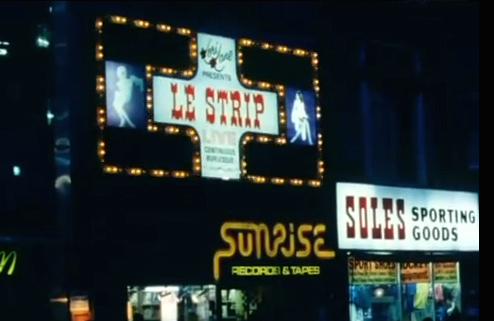
Le Strip during its heyday in the 1980s…
The person who reacted to the Comment – David Hughes – had worked as doorman/cashier/DJ at Le Strip from 1982 to 1994.
In the reaction he posted, he mentioned an exotic dancer with the stage name ‘Black Magic’, a spy story, neo-Nazis and the largest counterfeit money scheme in Canadian history. He finished with “There is a lot more to the backstory that I won’t get into here but I have been giving some thought to writing a memoir about it in the future.”
So, obviously, I contacted him and said: “If you want to give the bare outline of the story/stories, without undermining any future memoir of yours, obviously I and my blog readers would be fascinated to know more…”
As I had no period photographs of David nor of ‘Black Magic’ for yesterday’s blog, I had asked Gencraft AI to come up with an imagined illustration. This was what I got:

I reckoned I would get no reply from David, but an email came back, starting: “Can I just say that Gencraft’s AI has made a remarkably accurate rendition of ‘Black Magic’ except it has made her a little heavier and doesn’t portray the black leather gear she wore that gave her the stage name ‘Black Magic’ – She wore a simple black leather outfit with motorcycle chaps and cat-of-nine tails.”
So, for this follow-up blog, I asked Gencraft to create an image of “a thin female dancer wearing a black leather outfit with motorcycle chaps and carrying a cat-of-nine tails”.
Clearly, the phrase “cat-of-nine tails” is not one that has permeated the mind of current AIs. This was the image created:

Be that as it may, David did expand a bit on the backstory he had mentioned in yesterday’s blog. Yesterday, he said that there was a “spy story” involving one of Le Strip’s DJs named Grant Bristow.
Bristow became a vital undercover CI (Confidential Informant) for CSIS (the Canadian Security Intelligence Service) during a lengthy investigation into the neo-Nazi/extremist far right in the mid-1980s/mid 1990s as a result of a meeting between Bristow and Heritage Front member Max French which occurred at the Le Strip club.
The Heritage Front was a Canadian white supremacist neo-Nazi organization founded in 1989
David Hughes explained to me:
Grant Bristow’s meeting with Max French at Le Strip was arranged by me… At the time, Grant was a Confidential Informant for CSIS (which I also had a indirect role in creating) after I had told Grant about a fellow employee (Max French) who had befriended me when I was hired on to the Canadian Pacific Railway in Toronto as a trainman in September 1986.
Max French was then a Conductor at CP Rail and, when he found out about my background (ex-cop/soldier and former armored car guard), he thought I would be a perfect member of the Heritage Front in which Max was thoroughly ensconced. He was a senior member of its hierarchy and leadership.
Max was very upfront with me. He told me about his role in the US in the early 1980s in a militia group called CSA – the Covenant, the Sword and the Arm of the Lord.
This was an extremist far right Christian Identity religious group that had a fortified compound in the Southern USA.
The CSA was a group which spawned the terrorist group led by Robert Mathews known as The Order or Silent Brotherhood.
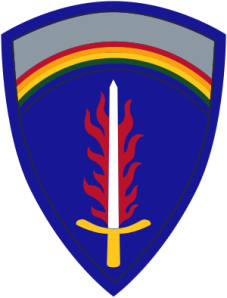
CSA confusingly adopted the shoulder sleeve insignia of the United States Army Europe and Africa
Max also told me that he and his Canadian colleagues were going to emulate the The Order’s tactics in Canada and that he felt I would have the inside information to help conduct armored car holdups which would help to fund the Heritage Front’s efforts to stir up racial unrest in Canada and so further the groups aims.
What Max didn’t know was I was already a Confidential Informant for the Ontario Provincial Police as a result of my inside role in the counterfeit money scheme that had occurred in 1984 at Le Strip.
I refer to that as “How Le Strip saved Christmas” for Toronto merchants by preventing the laundering of $20 million US dollars during the peak Christmas sales rush and the seizure of said monies and the arrests of all the perpetrators involved which, sadly, included my ex-girlfriend ‘Black Magic’ and her husband.
In 1986 all involved were convicted and sentenced to jail terms in federal prison except for my ex-girlfriend who was found not guilty… I was the Crown’s chief witness during the trial.
When Max French told me what he had in mind for me, I immediately contacted the people in the Ontario Provincial Police (the OPP) who had handled me during the counterfeit money scheme and they in turn turned me over to OPP Security Service member Detective Sergeant Hans BrocVogel and OPP Intelligence Squad Detective Daniel Maclean.
…and so began my plunge into the fringe world of neo-Nazi and far right extremist groups… a world that I found horrendously sad and tragic.
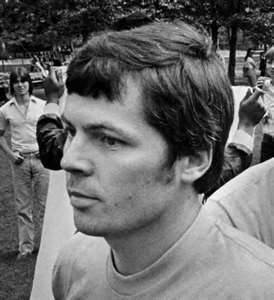
Robert Mathews of The Order/Silent Brotherhood
During a road trip with Max French to Howell, Michigan, where I attended one of Pastor Robert E. Miles‘ Klan gatherings, I met the widow of Robert Mathews and his newly-born daughter (who never met her father because Matthews was killed in a shootout with the FBI on Whidby Island in the Pacific northwest before she was born).
It was the only time I was ever paid by the OPP for any of my activities as a Confidential Informant – they reimbursed me for the gas money I paid to make the trip with Max to Howell, Michigan and back.
When I signed for the money in BrocVogel’s notebook he and his Intelligence counterpart Daniel Maclean both wanted me to become further engaged with the Heritage Front.
I balked at the idea after discussing the matter with my wife and so it was arranged that I would set up the meeting with Max French and Grant Bristow at Le Strip… which I did in the hope that Grant would ingratiate himself with Max and I could slowly exit, stage left.
If only things were to go according to the plan!
Life for David Hughes is much quieter now – He retired from the Canadian Pacific Railway in 2019, after 33 years of service.
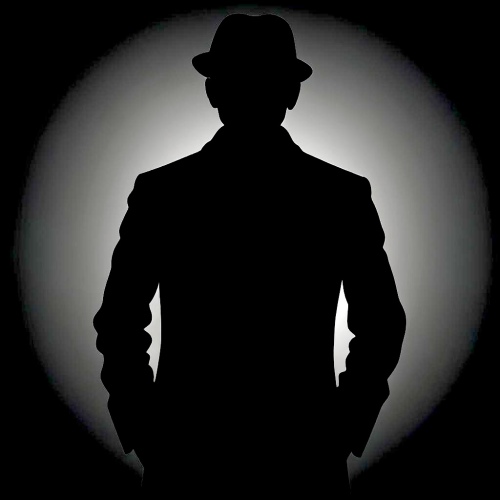
David Hughes in 2024, as imagined by the Gencraft AI…
Max French also retired from the Canadian Pacific Railway in 2016 or 2017.
David says: “I have no idea what he is up to now.”
French was interviewed by Vice in 2017, for a piece sub-titled: When neo-Nazis are congregating at the public library without issue, something’s amiss…
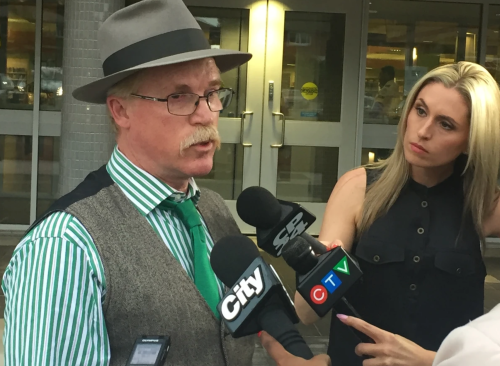
Max French interviewed in 2017 for a piece about white supremacists… (Photo by Rachel Browne)
(MORE ON ALL THIS IN THE NEXT BLOG – “The Canadian spies, white supermacists and South African secret agents affair…” HERE…)


